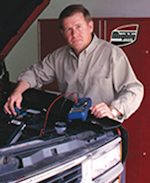Servicing Fuel Filters: Neglecting a Filter Replacement Can Be Costly
While much emphasis is placed on servicing filters during routine vehicle maintenance, little attention is given to the fuel filter until an engine performance issue occurs. Neglecting the fuel filter can result in damage to some expensive components such as an electric fuel pump or costly fuel injectors. Following are reasons why some vehicles encounter multiple fuel pump failures.
Identifying a Defective Fuel Pump
Prior to replacing the fuel pump, a thorough diagnosis should be performed to make certain that available current is getting to the pump. This should include checking relays, pressure sensors, inertia switches and, in some cases, the security system, which can prevent fuel pump operation. Some pumps fail due to a worn commutator bar on the armature. Tapping the fuel tank with a rubber mallet may move the armature enough to allow electrical contact, promoting fuel pump operation. This is a temporary solution.Don’t be fooled by a fuel pump providing sufficient pressure but low volume. Low fuel pressure or insufficient volume will affect engine performance and may set a diagnostic code due to lean fuel conditions. Most fuel pumps will pump one pint of fuel in 30 seconds. Follow the vehicle manufacturer’s guidelines for pressure and volume testing.
Leading Causes of Fuel Pump Failure
1Fuel is the coolant and lubricant for the fuel pump. Never allow the fuel level to get below one-quarter tank to prevent overheating of the fuel pump. Running a vehicle out of fuel can cause permanent damage.2Water in the fuel promotes corrosion, especially on vehicles stored for long periods of time. A low fuel level during cool or humid weather can promote condensation and corrosion. Ethanol can further aggravate the condition. Taking a fuel sample in a glass container can reveal fuel contamination. If the fuel is discolored or reveals the presence of water, replace the fuel.
3Dirty or contaminated fuel. Sediments in the fuel tank can clog the strainer, promoting overheating and premature fuel pump failure. Clean the tank before replacing the fuel pump.
4Fuel tank oxidation, which promotes the formation of deposits.
5When replacing the fuel pump, always replace the strainer. The strainer can catch contaminates larger than 70 microns; however, contaminants as small as 30 microns can pass through the strainer, causing permanent damage to the fuel pump.
6The fuel filter does not directly protect the fuel pump, as contaminated fuel passes through the fuel pump before it gets to the filter, with the exception of applications that have an in-tank fuel filter. The pump may overheat and fail while trying to pass fuel through a restricted filter. Replace the filter on a scheduled basis.
7A restricted fuel filter, strainer or blocked return line will stress the fuel pump, leading to pump failure.
8On vehicles equipped with a fuel pump module, heavy concentrations of rust deposits may require replacement of the fuel lines, especially when the contamination is minimal in the fuel tank but heavy deposits are located in the module.
9Purchasing fuel when a tanker is re-supplying a fuel distributor is not recommended, as many deposits are being dislodged in the storage tank.
10Contaminants that pass through the pump can cause pump seizure, resulting in increased amperage flow necessary to overcome the resistance, which can cause overheating of the wiring and related connectors. A restricted fuel filter can promote the same type of electrical failure.
11Special metals and coatings in the fuel system components are necessary for vehicles rated to burn E85 fuel to prevent fuel system corrosion.
Prior to replacing a fuel pump, make certain the loss of pressure or volume is not due to a restricted fuel filter, low voltage or a defective pressure regulator. Make fuel filter replacement a part of your service recommendation. It is the best preventive maintenance you can give the fuel pump.






